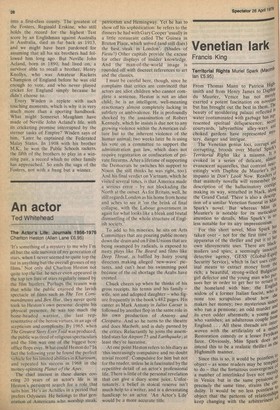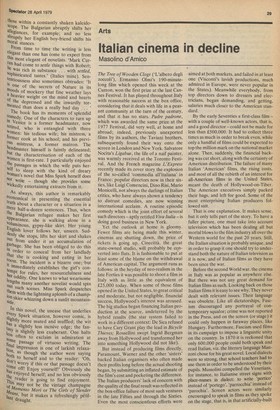Venetian lark
Francis King
Territorial Rights Muriel Spark (Macrnil" Ian £5.95) From Thomas Mann to Patricia sigh. smith and from Henry James to Daphlie du Maurier, Venice has not mere) exerted a potent fascination on novelists but has brought out the best in them. pi! beauty of mouldering palazzi reflected la water contaminated with garbage has reP, resented spiritual deliquescence; secte. courtyards, labyrinthine alley-ways arid choked gardens have represented riVs' tery, danger and intrigue. The Venetian genius loci, corrupt ari,d corrupting, broods over Muriel Sparic.s Territorial Rights like a miasma. It ist evoked in a series of delicate, al°. evanescent aquarelles, that contrast inter,. estingly with Daphne du Maurier's neii impasto in Don't Look Now. Readers ,e that masterly novella will remember tee description of the hallucinatory cortege making its way, wreathed in black, ale,ag the Grand Canal. There is also a deser non of a similar Venetian funeral in MI ,55 Spark's novel. But whereas Miss eti Maurier's is notable for its meticulous attention to details, Miss Spark's is 11° less notable for its airy impressionism.
For this short novel, Miss Spark taken over not for the first time apparatus of the thriller and put it to ne. own idiosyncratic uses. There are We/cm mailers and spies; a seemingly inn°ee'..,, detective agency, GESS (Global-EclY'r Security Service), which in fact uses OW inal means to extract money from t,11,e rich; a beautiful, strong-willed Bulgaria" girl defector and the young man who pur, sues her in order to get her to return,% the homeland with him; the Englis.s widow of a former Italian fascist, whekle none too scrupulous about how. sl's makes her money; two mysterious sIsIerd who run a pensione; an odd murder On its even odder aftermath; a young ola, who vanishes; an adulterous couple fro'. England . . . All these threads are in.teff woven with the artificiality of a 171111°0 Restoration comedy or a lesser FeYdeat farce. Obviously, Miss Spark does rife intend this to be a realistic thriller in Highsmith manner. Since this is so, it would be pointless No object as some readers may be ternPte f to do that the fortuitous convergence 7 a number of interlinked lives not nacre Yt in Venice but in the same pensione precisely the same time, strains the creo dulity. It would be no less pointless ,t, object that the patterns of relation5h11/ keep changing with the arbitrariness ci those within a constantly shaken kaleidoscope. The Bulgarian abruptly shifts her allegiances, for example; and no less abruptly her English boy-friend shifts his moral stances. From time to time the writing is less elegant than one has Come to expect from this most elegant of novelists. 'Mark Curran had come to settle things with Robert; lie was rich in substance . . . with settled, sophisticated tastes.' (Italics mine). Sententiousness also sometimes obtrudes: 'It IS one of the secrets of Nature in its Moods of mockery that fine weather lays a heavier weight on the mind and hearts of the depressed and the inwardly tormented than does a really bad day . The book has its moments of splendid comedy. One of the characters to turn up in Venice is a former headmaster, now retired, who is entangled with three women: his tedious wife; his mistress, a former cook at his school; and his previ°, us mistress, a former matron. The neadmaster himself is faintly delineated; hut the characterisation of each of the women is first-rate. I particularly enjoyed the passages in which the wife puts herself to sleep with the kind of dreary WoMan's novel that Miss Spark herself does n°1 write — though she provides some Wickedly entertaining extracts from it.
As always, this author is remarkably economical in presenting the essential truth about a character or a situation in a Mere half-a-dozen sentences. Thus, when the Bulgarian refugee makes her first aPPearance, she is walking alone in a voluminous, gypsy-like skirt. Her young English lover follows her, unseen. Suddenly she stops, lifts her skirt and shakes out from under it an accumulation of garbage. She has been obliged to do this in order to conceal from her landlady that she is cooking and eating in her ,r°orn. The incident is a bizarre one; but innmediately establishes the girl's conLtempt for rules, her resourcefulness and ,rier oddity. One knows to what wearisome lengths many another novelist would spin (Alt such scenes. Miss Spark despatches !hem with the lightning aplomb of a champ 1°n skier whizzing down a sunlit mountainside, In this novel, the unease that underlies every Spark situation, however comic, is ightly more muted and muffled; the wit as a slightly less incisive edge; the fanlasY is slightly less exuberant. One halts ess often to exclaim in admiration at sc.°Me passage of virtuoso writing. The !Mal impression is one of larkish relaxa,?(M, as though the author were saying noth to herself and to the reader: 'Oh, cicin't worry if this or that passage doesn't loitie off! Enjoy yourself!' Obviously she enjoyed herself; and no less obviously reader is going to find enjoyment. "is may not be the vintage champagne ?f, Memento Mori or The Girls of Slender antrear's, but it makes a refreshingly petil draught.







































 Previous page
Previous page